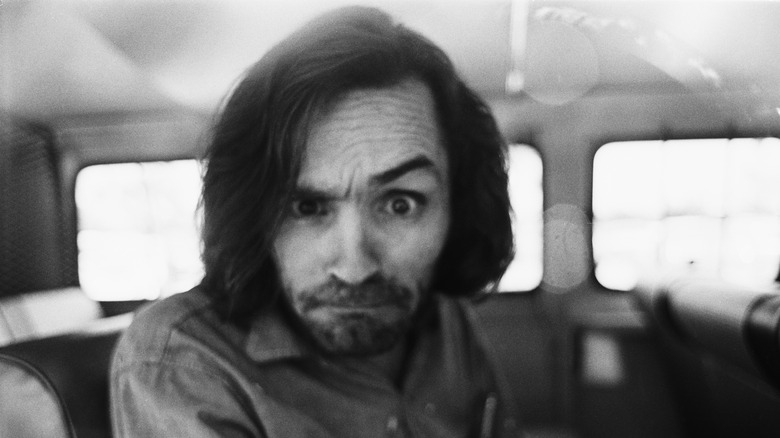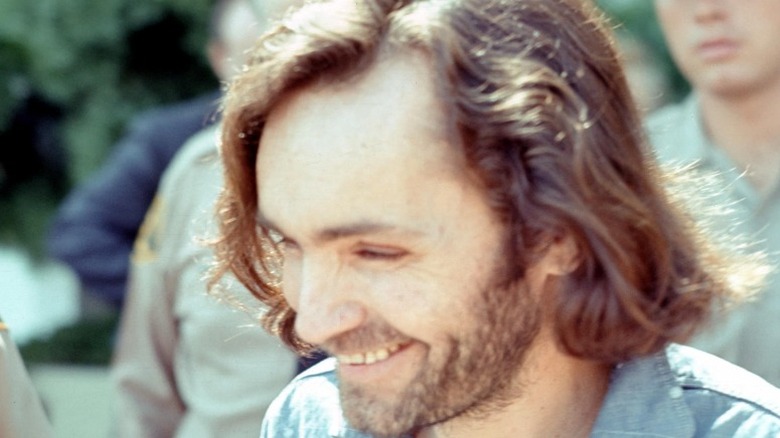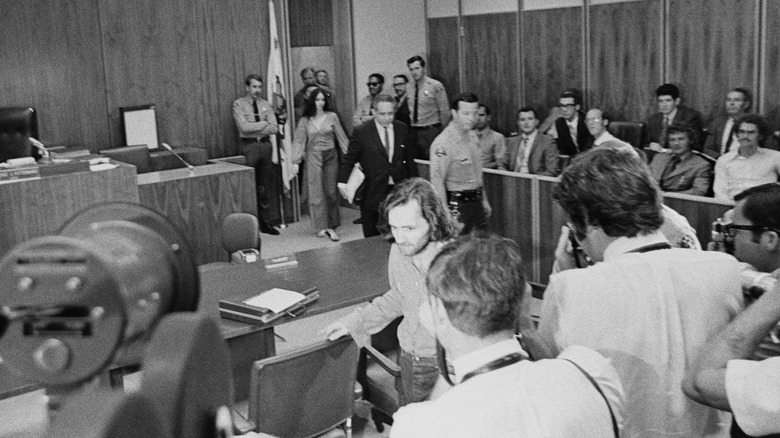What Happened To Irving Kanarek From The Charles Manson Case?
Correction: A prior version of this article stated Irving Kanarek died of cancer in 2020, but he died of natural causes. The article has been updated to reflect this.
The seven-month trial of Charles Manson and three of his cult followers opened on July 24, 1970. The descriptions of the brutality inflicted on seven innocent victims were coupled with the seemingly non-stop disruptions by both Manson and his co-defendants. In one incident, Manson leaped from his chair and tried to attack Judge Charles H. Older and had to be restrained by the bailiff (per CNN).
Prosecutor Vincent Bugliosi authorized more than half a million dollars to prosecute the infamous cult leader and murderer and was countered in court by attorney Irving Kanarek. The loud and bombastic approach of Manson's defense counsel may have helped fuel his client's outbursts in the courtroom. Kanarek made repeated objections during the trial, including during Bugliosi's opening statements to the jury (via Yahoo! News).
Though a skilled defense attorney, Kanarek was unable to secure a not-guilty verdict for Manson. Manson, along with Patricia Krenwinkel, Susan Atkins, and Leslie Van Houten were convicted of multiple counts of first-degree murder and sentenced to death, though their death sentences were later commuted to life in prison after a 1972 California Supreme Court ruling (per Famous Trials).
The opportunity to defend a high-profile client like Manson was a once-in-a-lifetime opportunity for any attorney — one that had the potential to reap a lot of exposure and financial rewards. But this wasn't the case with Kanarek.
Kanarek refused to cash in on Manson's infamy
Prosecutor Bugliosi made a mint off of his role in the Manson trial saga, penning the best-selling 1974 book "Helter Skelter." The book covered the Tate-Labianca murders, Manson's shady history, and the lengthy trials of both Manson and his cohorts. "Helter Skelter" went on to become the No. 1 true crime seller in history with over 7 million copies sold. But Kanarek wasn't going to go that route with the case after the trial.
Kanarek didn't write any books or engage in any venture that would have allowed him to profit in any way from his representation of Manson. Yahoo! News tells us that Kanarek had the opinion that doing so would violate attorney-client privilege. The lawyer stayed in contact with Manson in the decades after his conviction and felt that any information that would be useful in a book would be exploitative.
Kanarek also maintained that Manson was innocent of murder, even years after the courtroom drama had concluded. He told The Guardian that Manson's "evil" persona was the result of a media frenzy and that the evidence showed that Manson wasn't involved in the murders. He insisted that the evidence against Manson was hearsay and that no evidence connected him directly to any of the murders.
Kanarek experienced mental health issues later in life
As the years passed after the Manson trial, Kanarek found himself falling on hard times on more than one occasion. Yahoo! News reports of one situation where Kanarek got into a heated dispute with the Torrence, California district attorney, leading to police removing him from the premises in handcuffs. As a result of the incident, Kanarek was committed to the Harbor-UCLA Medical Center to undergo mental health treatment.
Late in his life, Kanarek revealed that he had spent time in a different mental health facility. After a lengthy stay, the attorney went back to find his law practice had been disrupted. While he was under care, several clients filed claims against him that led to the California Bar Association paying out settlements. The $40K in debt he was greeted with upon his release made him choose to surrender his license to practice law soon afterward. He maintained in interviews that the claims were "bogus," but that he was not financially able to fight the Bar on their ruling.
The Los Angeles Times reported that Kanarek spent several years living in a motel, surviving off of his social security checks. He wasn't able to afford a vehicle and his ability to better his financial situation was hampered by the Bar blocking his license reinstatement until he was able to pay back the money they assessed against him.
Kanarek once tried to sue Bugliosi for libel
After the Manson trial, Kanarek filed a suit against Bugliosi, claiming that the prosecutor had made committed libel against him in his book "Helter Skelter." Yahoo! News reports that the claim centered around Kanarek alleging that the book portrayed him as "a bumbling, stumbling, foolish, ridiculous attorney." The $11 million lawsuit was ultimately dismissed by the courts.
Kanarek told The Guardian in a 2014 interview that he had no regrets about defending Manson and would do it all over again if he could. He quipped, "I would defend a client who I knew was guilty of horrific crimes. They have to be proved guilty. I've had cases where people were guilty as hell but they couldn't prove it. And if they can't prove it, he's not guilty. In that case, the person walks free. That's American justice."
Kanarek died of natural causes on September 2, 2020 (via the LA Times). The retired attorney was 100 years old (per The New York Times).



